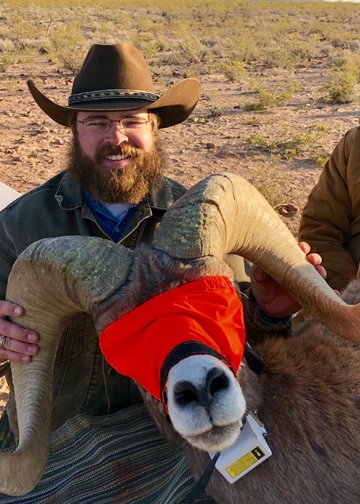
Jacob Locke
Sul Ross State University
Master of Science in Range and Wildlife Management
A Carrying Capacity Estimate and Grazing Regime Analysis Based on Pronghorn Preferred Forage in Trans-Pecos, Texas
My name is Jacob Locke and I was raised in Center, Texas, deep in the pineywoods of east Texas. I spent a lot of time hunting and fishing growing up in a small town surrounded by national forests and many lakes. This upbringing in the outdoors led me to study wildlife in college. I graduated from Texas A&M University in May 2018 with a Bachelor of Science degree in Wildlife and Fisheries Sciences with an emphasis in Wildlife Ecology. I now have the privilege to continue my education in the wildlife ecology field by pursuing a Master of Science degree in Range and Wildlife Management studying pronghorn ecology in Far West Texas. My thesis project is part of the Trans-Pecos Pronghorn Restoration Project. More specifically, I am developing a carrying capacity estimate for pronghorn in the two main restoration areas, as well as conducting an analysis on how different cattle grazing regimes affect pronghorn forage production.
UPDATE
I am very fortunate to be a recipient of the Dan L. Duncan Scholarship for 2019-2020. I
am very grateful to the Houston Safari Club Foundation for investing in me and providing
crucial support throughout my time as a graduate student at Sul Ross State University.
My masters’ research focuses on pronghorn habitat management. Specifically, we are
examining how different cattle grazing regimes affect pronghorn forage production, as well as developing pronghorn carrying capacity estimates in two key Texas Parks and Wildlife
Department pronghorn restoration areas in the Trans-Pecos.
Recently, I have been able to present my research on the effects different cattle grazing
regimes have on pronghorn forage production at two different meetings. In September at the Trans-Pecos Chapter of the Texas Grazing Lands Coalition meeting, I was awarded the first-place prize for my three-minute professional presentation. In February at the annual meeting of the Texas Chapter of the Wildlife Society, I gave an oral presentation on my research findings.
My time and experience at the Borderlands Research Institute at Sul Ross State
University has been incredible, and thanks to your contributions, I have been able to focus on my studies and research while also being able to volunteer and support my fellow graduate students and Texas wildlife community. My graduate career has truly provided me incredible experiences that I am extremely thankful for including vegetation sampling for mule deer and pronghorn, pronghorn fence modifications, grassland bird captures, mule deer captures, desert bighorn sheep captures, aoudad captures, turkey captures and translocations, pronghorn captures and translocations, flying aerial pronghorn surveys, and countless radio telemetry work, most of which was voluntary.
Thank you again for supporting me through my graduate studies and allowing me all of
the experiences I have been able to receive. Your contributions have actively played a role in wildlife conservation in Texas. I am proud to have Houston Safari Club Foundation supporting me and am very grateful for your aid in jumpstarting my career as a wildlife biologist.

